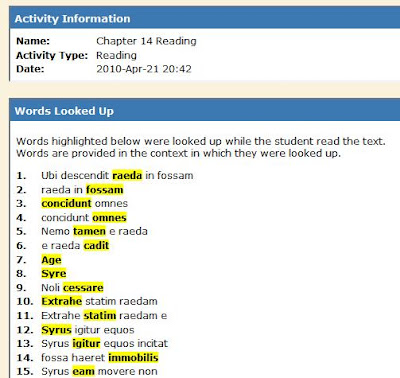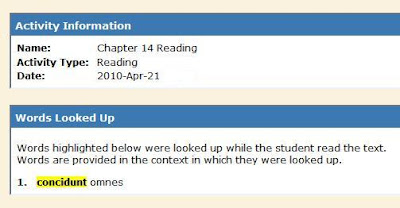
After discussing Wordchamp with
esteemed colleagues (Kerry Daus and K.C. Kless)
I decided to establish Wordchamp Wednesdays.
Why? Because there are too many accolades
to pile into one post.
Over the past few months, I have kept referring to this article:
http://www.encounters.jp/mike/professional/publications/vocabulary.html by
Michael P. Critchley, and its profound statements have helped me quite a bit in fashioning formative exercises for my students.
Today, I will be addressing what he calls fine tuning the approximate meanings learned from a word list.
First, here is an example of a student's first try with a set of vocabulary. In it, you can see the student spent about 5 minutes on the words and got 17 right the first time. Wordchamp puts words that are missed back in the stack, and then the student has to get it right two more times in order for it to go into the "correct" category. So, this student missed 10 originally and then made the corrections.

Same student, next attempt. Look at the improvement.

Within Wordchamp, a teacher has access to a webreader which allows a student to hover over a word and see the meanings of that word in a dictionary-style entry. Because there are a variety of meanings provided, the student must use an approach that can elicit the best meaning for the word in context. When a student has memorized a single meaning from a vocabulary list s/he is at a disadvantage, because the flexibility in meaning is eliminated. A methodology which encourages negotiation of meaning helps the student to improve fluency.
Here's a picture of info provided by Wordchamp about a student's reading experience. It's showing me what words the student is having to hover over as she reads along in context. The student can click on those words and practice them, then try the reading again. This student practiced her list and did the reading a second time.
1st try:

2nd try, after practicing the words. Notice, ONLY ONE WORD is a challenge this time.

Anecdotal evidence: Students (17) who spent 20-30 minutes and assembled their own list of associative meanings for words in an original reading scored in the 4-5 range of proficiency as opposed to students (22) who spent 5-15 mintutes and did NOT assemble a word list, and scored in the 1-3 range range of proficiency.
What we are seeing is that students who "hover" and choose a meaning that has context, then practice that meaning, have a better ability to negotiate meaning when they are in situations where the original "memorized" term does not apply.
Wordchamp provides a visual rendition of which words the student "hovered" over, and also a list of "most missed" words from a vocabulary list. The teacher can also assemble contextual sentences to teach various meanings of the same word-the skill that we implicitly employ in our native language.
Furthermore, when presented with the information, even 7th-8th grade students understand the implications. As I presented data about 5 or 6 vocabulary words, the students verbally made the connection and created conditions (individually) for their own re-learning of the words. I'm looking forward to seeing what these children do with the work in 8th, 9th, 10 and nth grades!








